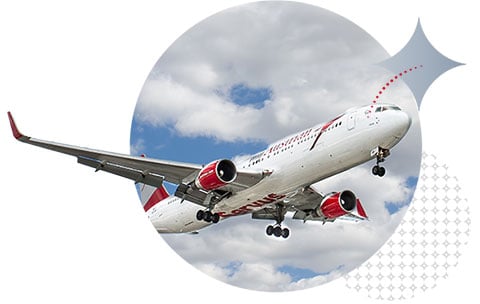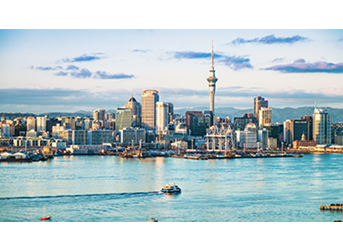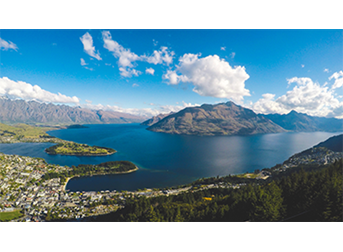How to move to New Zealand
Make the most of your money for the move



Guide on moving to New Zealand
7 minute readNew Zealand has much to offer expatriates. With its breath-taking scenery, bountiful vineyards, and thriving cities, it has long proved a popular destination for those seeking a more relaxed lifestyle. Whilst there are a number of requirements that expats must satisfy in order to move to New Zealand, this has done little to weaken its appeal to Brits looking for a new life abroad.
Whether you intend on moving for professional reasons, looking to purchase a home or spend your retirement days in the land of Hobbits, you’ll need to make sure that you’ve prepared all of the paperwork and taken everything into consideration when moving to New Zealand from the UK.
Do you need a visa to live in New Zealand?
British citizens need to acquire a visitor visa, or an NZeTA (New Zealand Electronic Travel Authority), if they wish to visit New Zealand as a tourist and see family and friends. Those planning to emigrate to New Zealand, on the other hand, are required to obtain a permanent visa, and there are several ways in which they can go about this.
Skilled migrants are welcome in New Zealand; the government launched the Green List scheme in September 2022 to attract specialised talent from overseas. The Green List comprises a range of highly skilled, hard-to-fill occupations, and it provides a fast-track to residency for globally in-demand workers. Civil construction supervisors, primary school teachers and registered nurses are amongst the occupations on this list. Those employed in a Tier 1 role may be eligible to apply for fast-track residence, and those in Tier 2 may be eligible to apply for residence after two years. You can apply for these roles in both the UK and New Zealand.
If your partner is a citizen or resident of New Zealand, you can apply for residency. People with adult children who are New Zealand citizens or residents can also apply to live in New Zealand permanently under the Parent Retirement Resident Visa; you will, however, require an annual income of NZ $60,000, in addition to NZ $1 million to invest for 4 years, and another NZ $500,000 to cover your living expenses.
There is also the option of the Temporary Retirement Visitors Visa for those over the age of 66. This allows people to stay in New Zealand for up to two years, and it requires that applicants have NZD $750,000 to invest in New Zealand, an additional NZD $500,000 to live on and an annual income of NZD $60,000. Dependent children cannot be brought under the terms of this visa.
Which visa should I apply for?
New Zealand offers for the following visas for those looking to visit or emigrate:
- Visitor visas
- Student and Trainee Work visas
- Work Exchange Scheme visas
- Permanent Resident visas
- Family visas
- Business Visitors visas
These categories include many visa sub-types with varying requirements, and so it’s worth taking the time to understand which visa best suits your needs in order to secure the best chance of moving to New Zealand.
Does New Zealand have a points-based immigration system like Australia?
The government of New Zealand offers skilled migrant visas through a points-based system, with the aim of attracting people with skills that can contribute to the country’s economy. Points are awarded based on a variety of factors, such as age, i.e. if you’re under the age of 56, qualifications, work experience and whether or not you have an offer of skilled employment.
Much like the Australian points-based system, applicants have to meet a minimum threshold of 6 points in order to lodge an Expression of Interest in the Skilled Migrant Category Resident Visa.
How can I apply for my New Zealand visa?
You can apply for most visas online via the official New Zealand immigration website, where a more detailed breakdown of each visa is provided. Bear in mind, however, that some visas need to be sent with various application forms, your passport and other supporting documents.
Applying for a visa will involve uploading several documents, and so it’s best if you have scanned copies available before you start your application.
What currency is used in New Zealand?
The New Zealand dollar (NZD) is the currency that is used in New Zealand. Also known as the “Kiwi”, it is used across the North and South islands of New Zealand. The New Zealand dollar is one of the most heavily traded currencies in the global foreign exchange market, despite the fact that it is issued in a mid-sized economy.
If you are emigrating to New Zealand from UK, you can track the GBP to NZD rate with our currency chart. You also have the option of setting up a rate alert. This allows us to inform you by SMS or email if the exchange rate has met your desired level before you make an overseas payment.
Foreign currency exchange for moving to New Zealand
If you wish to move from the UK to New Zealand on a permanent basis, you’ll most likely need to transfer money between your New Zealand and UK bank accounts on a regular basis.
Whether you want to buy a house or transfer funds from your pension to your New Zealand bank account, we can assist you by providing low-cost international payments. With some UK high street banks charging up to £30 in transaction fees per transfer, you stand to save considerable amounts of money by partnering with Moneycorp.
As a team of dedicated foreign currency exchange specialists, we are committed to saving you time and money on your overseas payments. We offer low transfer fees and competitive exchange rates when you exchange GBP to NZD.
How to manage your housing costs
For those moving to New Zealand, accommodation is likely to account for the greatest cost. The cost of utilities, whilst fairly reasonable, are not normally included in the rental prices of property; they are instead included in the local taxes that are levied on property owners. Bear this in mind when preparing your budgets.
The good news is that the cost of housing in New Zealand is much lower than that in Europe and America: New Zealand’s biggest city, Auckland, ranked 95th in Mercer’s Cost of Living Survey 2022, with Wellington, the capital city, ranking in 120th place. If you intend on moving to Auckland and buying your own residence, you should expect to receive more in return for your money than in London. An apartment in the city centre is likely to cost you half of what it would in London.
Getting to grips with motor vehicle costs
If you wish to import your car or motorcycle to New Zealand, you will not be subject to import tariffs, but you will have to pay a Goods and Services Tax (GST) of 15%. GST is calculated based on how much you paid for your vehicle, your transport and insurance costs and any import duty that you might have had to pay. It is possible, however, to gain an exemption from GST if you meet certain criteria, e.g. if your vehicle has been owned and used for the last 12 months, you are willing to sign a deed in which you agree not to sell it for at least two years, etc.
When you buy a car in New Zealand, you should expect to pay much less (perhaps as much as 30% less) than you would in the UK. Petrol and diesel are much cheaper in New Zealand, allowing you to get from A to B at a considerably lower cost.
Open an account to start transferring today
Discover our business solutions
Tips on making the most for your money when you emigrate
Our News Hub offers plenty of easy-to-read guidance on how to emigrate abroad.




